Ford government ‘working on’ anti-scalping plan, unlikely to be in place for Blue Jays games
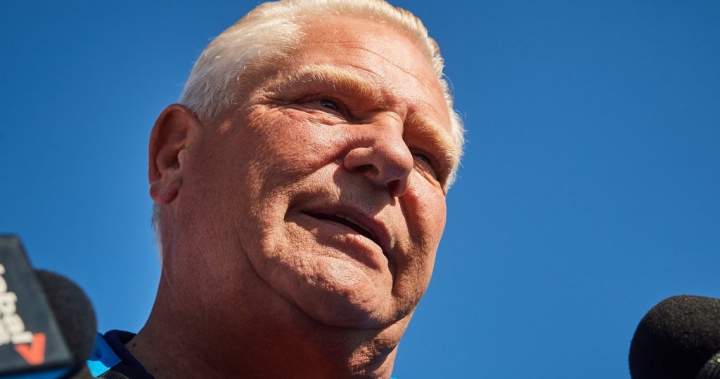
Ontario Premier Doug Ford says he has left his team to figure out how to crack down on those profiting from resold baseball tickets but doesn’t have a solution to announce as the Toronto Blue Jays’ World Series run heads into Game 4.
As tickets to catch a moment of the Toronto Blue Jays’ post-season run sold for thousands, Ford had mused about reviving anti-scalping legislation his government killed shortly after it originally came to power.
On Tuesday, the premier insisted he was still looking at the idea, although he doesn’t have a timeline, suggesting it is likely not to come in until long after the Toronto Blue Jays versus Los Angeles Dodgers series has ended.
“We’re working on it right now because people shouldn’t be gouged and that’s what’s happening right now, no matter if it’s the World Series or a concert comes in,” Ford said.
“I left it with our team to come up with a few solutions to make sure it’s fair for the average person to be able to go to a game because right now, what I’ve seen, especially the World Series, any big concerts coming to town, certain companies are gouging the people.”

Get breaking National news
For news impacting Canada and around the world, sign up for breaking news alerts delivered directly to you when they happen.
Ford first suggested he was open to the idea last week; however, his government has since voted down opposition efforts to immediately introduce measures to protect fans.
“People deserve a break from the stressors of daily life and be able to go to a concert or a sports game without paying outrageous prices. Ford’s Conservatives chose to protect ticket scalpers and lobbyists instead,” Ontario Libreal MPP Tyler Watt said in a statement.
The idea was floated as Blue Jays fans took to social media to vent their frustration at post-season tickets costing thousands of dollars.
The anger over price resales is not new, with anger erupting last year during Taylor Swift’s Eras Tour, which saw similar ticket prices and frustration.
Ford’s government previously scrapped part of a law that would have capped ticket resale prices at 50 per cent above the original face value.
A section in the previous Liberal government’s Ticket Sales Act would have imposed that cap, but the Progressive Conservatives paused implementing it shortly after the 2018 election.
A year later, in 2019, it cancelled the rule, saying it was unenforceable and that it would have driven consumers to buy tickets on the black market and drive costs higher.
Opposition parties have indicated they would support bringing the law back.
— With files from Global News’ Sean Previl
© 2025 Global News, a division of Corus Entertainment Inc.

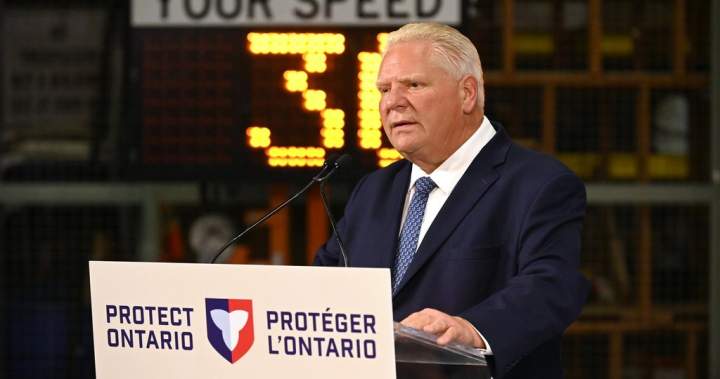
Ontario Premier Doug Ford’s government is proposing to limit debate and avoid public input on three pieces of legislation, including one that would end the province’s speed camera program.
Government House Leader Steve Clark is proposing to fast track a red tape reduction bill that includes banning speed cameras, a labour bill and an emergency management bill.
Clark’s proposal indicates the government plans to stop any further debate at the second reading stage for the three bills, then entirely bypass the committee stage that usually follows — a time to hear from the public on the bill and make any amendments — and limit debate time for the final, third reading stage.
Ford has been vocal over the past couple of months in his opposition to speed cameras, calling them a “cash grab” only meant to generate revenue for municipalities, but the communities themselves, as well as parents, police chiefs and researchers at the Hospital for Sick Children have said they save lives and should stay.
Clark said the ministers responsible indicated they were good with the debate that had already occurred in the House for second reading, and the premier has signalled his keen interest in enacting the red tape reduction law.

Get breaking National news
For news impacting Canada and around the world, sign up for breaking news alerts delivered directly to you when they happen.
“It’s a priority of the government that clearly was indicated right at the highest levels,” Clark said after question period. “That’s why I scheduled it the way I did.”
NDP Leader Marit Stiles said matters in all three of the bills deserve public scrutiny and attention, but this government is not interested in debating the issues.
“They want to push through things,” she said. “They don’t want to have any opportunity for the public, or people who are going to be impacted by legislation, to have a say in the decisions that are going to impact them. It’s more of the same, but it’s getting worse and not better.”
The government limited debate and committee time on numerous bills in the legislature’s spring sitting, and Liberal parliamentary leader John Fraser said it feels like Groundhog Day as the government already starts bypassing normal processes in week two of the fall sitting.
“They just figure they can do whatever they want, and that people aren’t paying attention,” he said.
“You’ve got to take time. You’ve got to get it right. You’ve got to listen to the other side. And the government’s not listening … When you fast track stuff like this the way that they’re doing it, it doesn’t serve anybody, and it makes for really bad pieces of legislation.”
More than 20 mayors from across the province have asked Ford to tweak the speed camera program instead of scrapping it entirely, but Ford quickly shut them down.
Ford has said he doesn’t believe speed cameras work to prevent speeding, saying traffic calming measures such as speed bumps, roundabouts and big signs with flashing lights are more effective.
Data from several municipalities that have analyzed the effect of the cameras on traffic speeds, as well as a different study from SickKids and Toronto Metropolitan University, show speeds are reduced.
The red tape bill would also allow for greater movement of workers, largely in health care, between provinces and “streamline” the Clean Water Act.
The labour bill includes requiring automatic external defibrillators on construction sites and requiring job posting platforms to have mechanisms to report fraudulent job advertisements. The emergency management bill sets out roles and responsibilities the government says would enable better communication and co-ordination.
© 2025 The Canadian Press
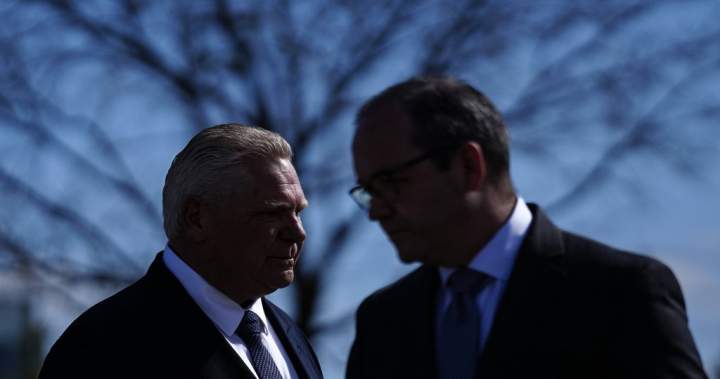
Ontario Premier Doug Ford is defending his plans to scrap fixed election dates and significantly hike donation limits for political parties, calling one of the rules he is scrapping a “fake law.”
The Ford government announced on Monday afternoon it intended to make major changes to the rules governing elections in Ontario as part of its Fall Economic Statement, including to donations, spending and the date voters head to the polls.
The latter change would abolish the existing fixed election date for Ontario. Under the current rules, an election would have been held in 2029, four years after Ford’s snap win earlier this year. Instead, the premier will now be able to serve the full constitutional term of up to five years.
Asked about the change, Ford said he didn’t know if he’d call the next election in three, four or five years.
“As far as this is concerned, that’s a fake law put in by the Liberal government,” he told reporters on Tuesday.

Get breaking National news
For news impacting Canada and around the world, sign up for breaking news alerts delivered directly to you when they happen.
“We’re going to move forward and call an election when the time is appropriate. I think it’s up to five years, but could be four, could be three.”
Ontario’s fixed election dates were enacted about 20 years ago by then-premier Dalton McGuinty. Although the law provided a date for the election, it was still possible for premiers to dissolve the legislature early, as Ford did for February’s snap election, which he won for a third successive majority.
During that same election, the Ontario Progressive Conservative party asked voters for a “strong, four-year mandate” to eclipse U.S. President Donald Trump’s second term in office. The party didn’t include plans to overhaul election laws in its campaign platform.
The changes announced by the Ford government for elections also raised the donations people can make to political parties by almost 50 per cent, to $5,000.
Opposition parties say the changes come at a time when the Ford government is under scrutiny for how it handed out public dollars through the skills development fund, including to applicants associated with donors and lobbyists.
“Very few people could afford that,” NDP Leader Marit Stiles said of the $5,000 donation limit. “What it tells me is that under the Ford government, only people with very deep pockets are going to have any influence.”
Global News asked Premier Ford whether regular Ontarians would be able to afford to donate $5,000. Ford said he was increasing the limit to bring Ontario in line with other, higher-donor political races.
“You can donate $5,000 to a mayoral candidate, why can’t you do it here? It’s very similar to other provinces across the country, so we’re just keeping up to the balance of the other provinces,” he said.
In Toronto, the individual donor limit for mayoral campaigns is actually $2,500.
The election changes, which will be included in the Fall Economic Statement next month, also include:
- The per-vote subsidy, which gives public money to political parties based on how many votes they receive, would be made permanent, rather than needing to be regularly extended.
- Strict spending limits on third-party advocacy groups — for example, unions — and political parties would be eliminated.
- Tighten the rules around third-party advertising registration and give Ontario’s chief electoral officer more investigative powers to deal with bad actors.
- Potentially ban political advertising on government property, which would include billboards and transit stations.
© 2025 Global News, a division of Corus Entertainment Inc.
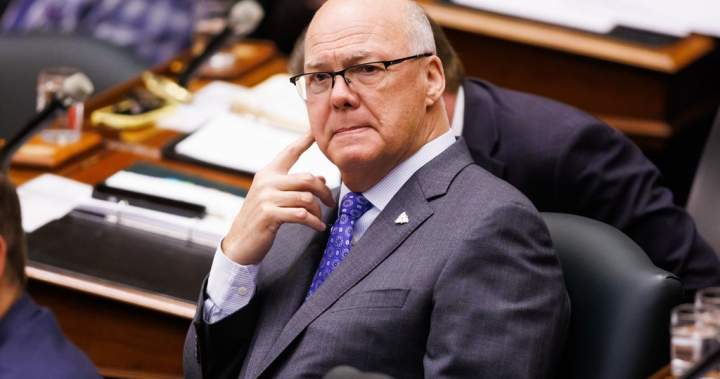
The Ford government will waive its portion of the sales tax on new homes for first-time buyers up to the value of $1 million as it bids to stimulate slumping home sales and housing starts in Ontario.
On Tuesday morning, Housing Minister Rob Flack and Finance Minister Peter Bethlenfalvy announced the move, confirming a policy which had, at times, appeared in flux.
The pair said they would use the Fall Economic Statement to rebate the eight per cent provincial portion of the harmonized sales tax for first-time home buyers on new homes up to $1 million. They estimated the change could save new homebuyers $80,000 when “combined with” other provincial measures.
“Our government is working every day to bring the dream of homeownership within reach for more people. Today’s announcement is good news not only for first-time homebuyers, but for workers and tradespeople who can keep doing what they love — building their communities,” Flack said in a statement.
“The actions we’re taking today complement our legislation and is just one more way we are protecting Ontario by creating the conditions to build.”
The Ontario government had previously signalled that if the federal government removed its portion of the harmonized sales tax for first-time homebuyers, the province would follow suit.

Get breaking National news
For news impacting Canada and around the world, sign up for breaking news alerts delivered directly to you when they happen.
The federal government proposed earlier this year to rebate the federal portion of the HST on new and substantially renovated homes valued up to $1 million for first-time homebuyers.
While homes valued up to $1 million would qualify for the full rebate, there will be partial rebates on a phased-in basis for homes valued up to $1.5 million.
The move confirms Ontario will only remove the sales tax from new homes for first-time buyers, rather than embracing a broader tax holiday advocated for builders. The latter is something Premier Doug Ford appeared to consider, until Bethlenfalvy told him it would cost too much.
“Let’s get rid of the HST,” Ford said at a news conference on Aug. 12, apparently offering the plan for all new homes.
“I will follow that — on anyone that buys a home, not just new homebuyers — on anyone. And let’s do it to a point of two years, so it puts pressure on the market…. That’s massive amounts of savings for people.”
Asked about the decision again at a separate news conference on Aug. 14, the premier abandoned the pledge — suggesting he had been told it was a move his government couldn’t afford.
“As for the HST, I got my knuckles rapped a little from the finance minister because he’s doing his job,” he said. “That’s a lot of money, but that’s something we’ll sit down with the finance minister and the prime minister and see how we can look at the HST for certain sectors.”
The back-and-forth over how much tax to waive comes as Ontario continues to post worsening housing data, and its goal of 1.5 million homes by 2031 slips away.
Two-thirds of the way through the year, in August, Ontario had achieved just 26 per cent of its goal for the year, and was the only province in Canada where housing starts are worse this year than last.
The Ford government won the 2022 election under a promise to build transit, highways and 1.5 million homes by 2031.
Despite introducing at least one housing law every year, the number of new homes in the province has stalled and starts are falling.
The province is yet to get near the 150,000 new homes it would need to hit every year for its target to be achieved.
Over the summer, Flack admitted homebuilding in Ontario was at a “standstill” and pointed to concerns about the cost of building.
The Fall Economic Statement — which will include the measure — is set to be tabled on Nov. 6.
— With files from The Canadian Pres
© 2025 Global News, a division of Corus Entertainment Inc.
-

 Uncategorized5 months ago
Uncategorized5 months agoShop Proud, Eat Proud, Be Proud — Ottawa Canada Day Market This June 28th
-

 4 months ago
4 months agoRing of Fire road to bring prosperity to First Nation, problems for caribou: report
-
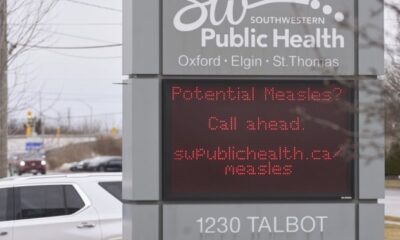
 5 months ago
5 months agoMeasles circulating in northeastern B.C. community, health officials warn
-

 5 months ago
5 months agoCanada’s world junior trial saw juries tossed, intense testimony. Here’s a recap
-

 4 months ago
4 months agoFormer major leaguer, Jays doctor Ron Taylor dies
-
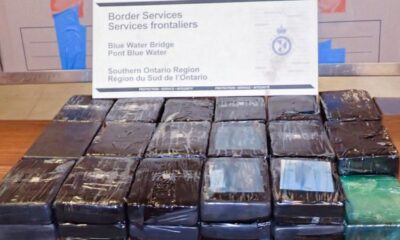
 4 months ago
4 months ago161 bricks of suspected cocaine found on truck trying to cross Canada-U.S. border
-
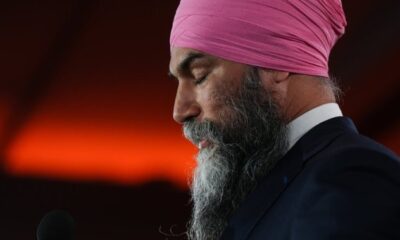
 4 months ago
4 months agoJagmeet Singh apologizes for attending Kendrick Lamar concert after Drake calls him out
-
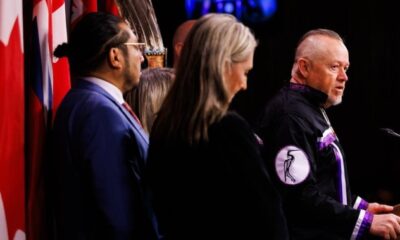
 5 months ago
5 months agoAnishinabek Nation chief says he briefed Ontario police on protests against Bill 5





